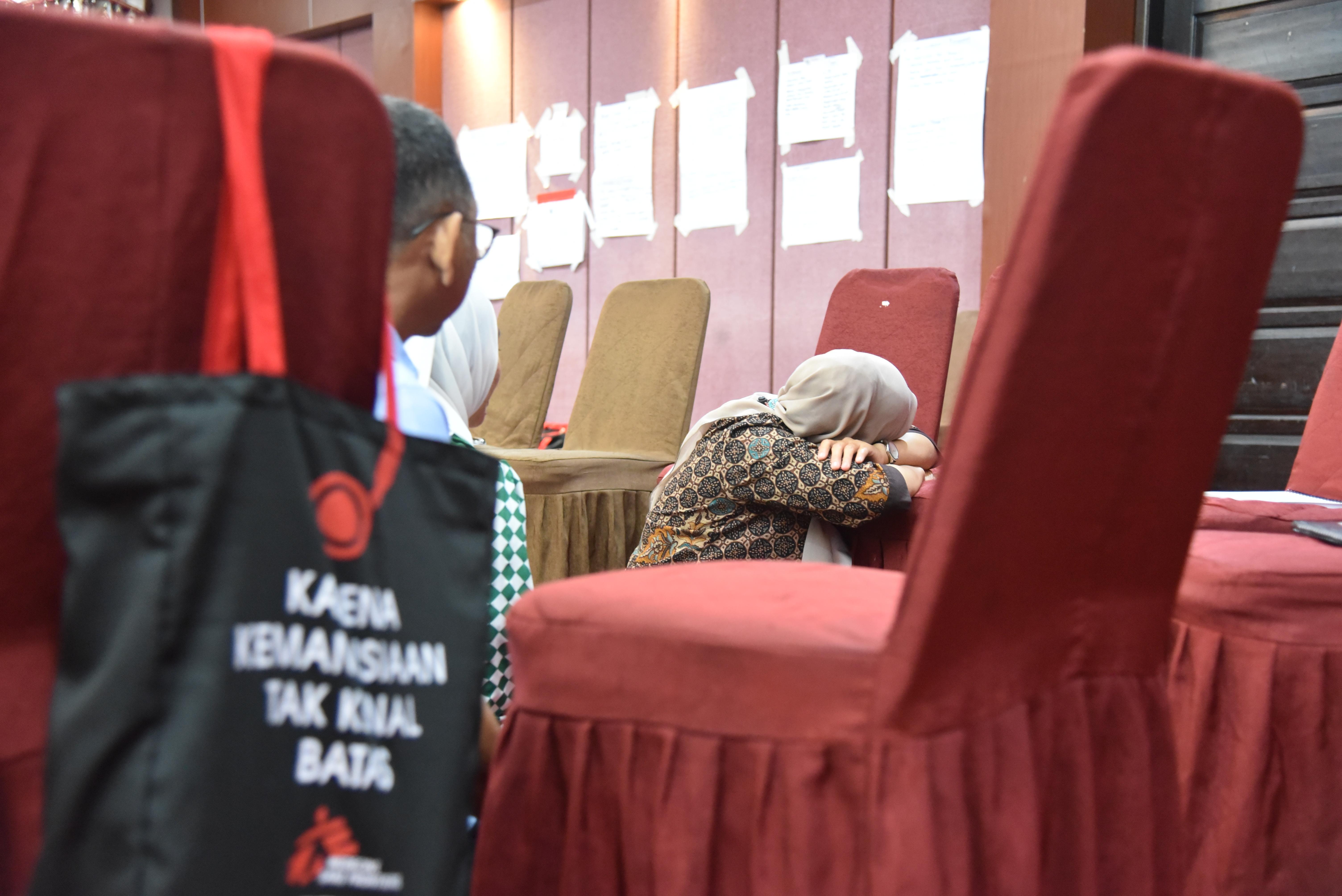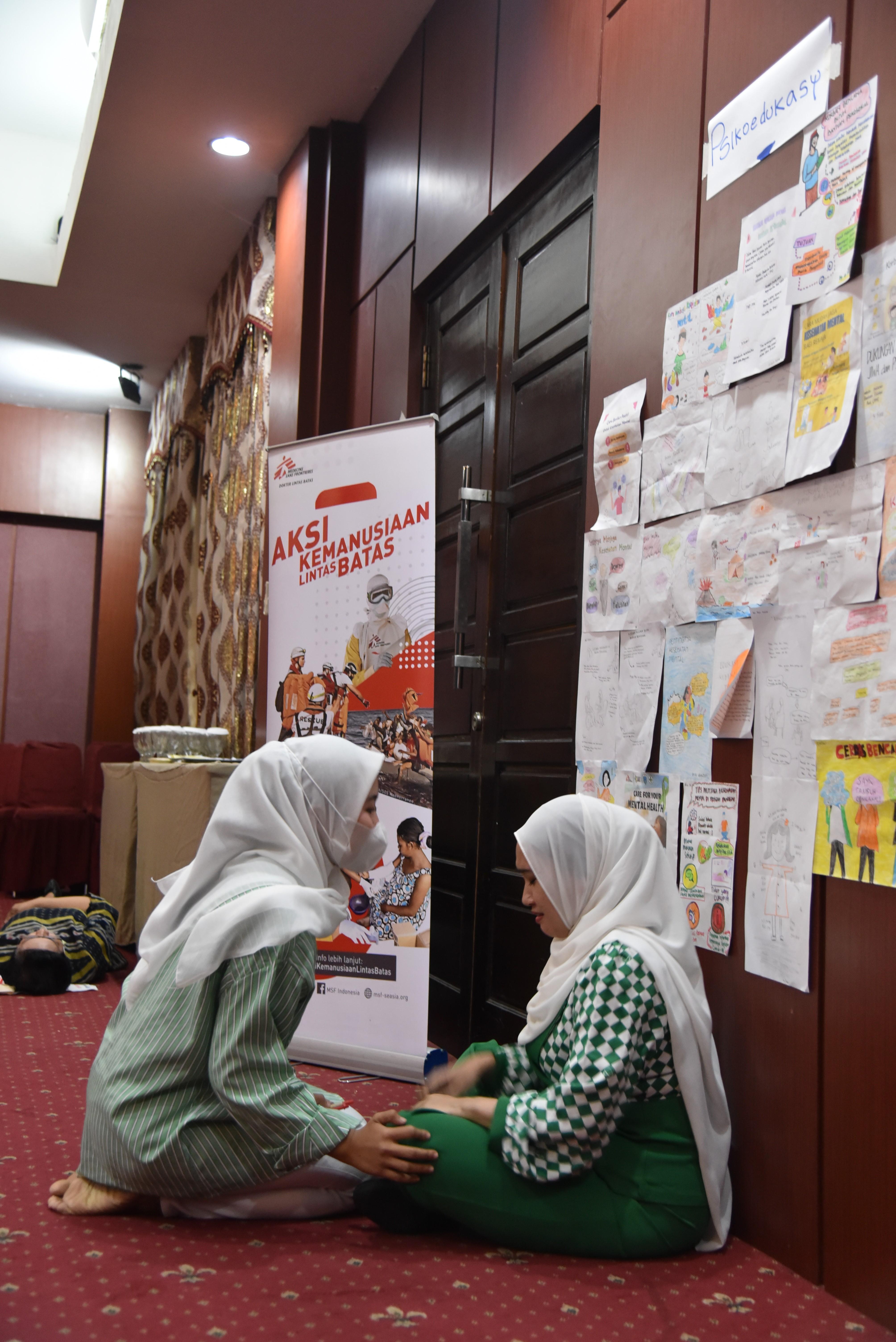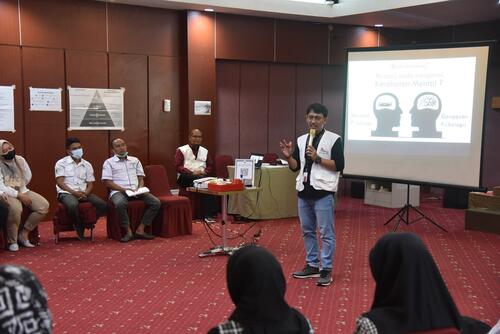Written by: Jane Luvena Pietra / MSF Jakarta E-Hub Mental Health Training Supervisor
E-Hub mental health in emergency situations training is one of the four domains covered in this project of capacity building for emergency responders.
E-Hub mental health in emergency situations training is one of the four domains covered in this project of capacity building for emergency responders.
Emergencies including disasters, whether natural or man-made, leave in their wake not only physical devastation but also a profound impact on the mental well-being of affected people and their communities. It can create a wide range of problems at any level: individual, family, community, and societal (Inter-Agency Standing Committee, 2007). Also in the Indonesian context, people and their communities affected may be facing significant mental health challenges of concern. People may be at risk of developing anxiety, depression or any other mental health problems.
Especially people with severe mental health problems as well as other vulnerable groups are prone to face significant mental health challenges (WHO, 2022). According to Cazabat (2023) as the lead author of the Internal Displacement Monitoring Centre, Indonesia is one of the most disaster-prone countries in the world. It is also in line with the report made by Statista in 2023 that indicates Indonesia as one of the countries that is prone to natural disasters such as volcano eruptions, earthquakes, tsunamis, landslides and floods.

However, the challenges stemming from the inadequate numbers of Indonesian health workers further exacerbate the mental health crisis, especially during emergency situations. Its nature as an archipelago country that consists of thousands of islands with communities prone to disaster, makes it difficult to provide timely and comprehensive psychosocial support to those affected by disasters. The shortage of mental health professionals not only hampers immediate response efforts but also impedes the establishment of long-term mental health and psychosocial support (MHPSS) programs.
The limited numbers of health care workers as well as the lack of awareness and understanding of mental health during emergency responses worsens those challenges, emphasizing the need for targeted education and awareness building. Therefore, integrating mental health components into disaster response training for all health care professionals can help bridge the gap and ensure a more holistic approach to emergency response (Gray, Hanna, and Reifels, 2020).
The Mental Health Imperative
As we commemorated World Mental Health Day on 10 October 2023, the global community turns its attention to a pressing issue that often lingers in the shadows of emergency response: mental health. In this pursuit of a more inclusive and compassionate world, the spotlight is on the significance of E-Hub mental health training as a pivotal tool to ensure decent access to mental health care for those grappling with the aftermath of disasters.
The toll of disasters on mental health is often underestimated (UNDRR, 2022). Beyond the visible destruction, survivors grapple with trauma, grief, anxiety, and stress, which can have enduring consequences if not addressed promptly and effectively. Unfortunately, traditional mental health services are frequently insufficiently equipped or inaccessible, leaving a significant portion of the affected population without the crucial support needed for their mental recovery.
E-Hub Mental Health Training
Since 2022 Médecins Sans Frontières (MSF) and the Health Crisis Center of the Ministry of Health (MoH) Pusat Krisis Kesehatan (PKK) have collaborated on the E-Hub Project: a Capacity Building Hub for Emergency Preparedness and Response offering learning opportunities to the health crisis and disaster responders. Throughout 2023, the project has been delivering trainings in four domains which are Medical Emergencies, Environmental Health, Data Management and Mental Health. The project aims to improve the health crisis and disaster responders’ capacity to respond professionally to emergencies. MSF works in Jakarta and Banten area according to the agreement with MoH. These two areas are also prone to disasters such as earthquakes, tsunamis, flooding and landslides.

The mental health training theme, "Awareness MHPSS: Preparedness and Action" emphasizes raising awareness, preparedness and proactive measures in emergency situations. We target primary health workers and health crisis responders in Banten and Jakarta together with MoH staff and any other national as well as local organizations that respond to emergency situations as our participants. All in all, the training aims to answer the gap that exists in real situations during emergencies with emphasis on:
- Accessibility in the Face of Adversity
The E-Hub training program aims to address the need for accessible mental health support during emergencies by providing training to health workers and responders. Emphasizing pyramid intervention, multi-sectoral coordination and inclusivity, it aims to fill the gaps in the mental health awareness, knowledge and skills of health workers.
- Scalability for Swift Response
Disasters increase demand for mental health services, requiring rapid scalability through E-Hub trainings for mental health. This prevents long-term trauma consequences and addresses immediate community needs.
- Cultural Sensitivity at the Core
The E-Hub training aims to provide effective mental health care by incorporating cultural sensitivity, involving local health workers and communities and adapting to local context conditions using case studies, ensuring respectful and relevant support.
In the spirit of this year's theme, "Mental Health is a Universal Human Right", let us strive for a world where everyone, irrespective of their circumstances, has equitable access to the mental health care they deserve. By embracing and expanding initiatives like E-Hub mental health training, we can collectively foster a more compassionate, inclusive, and mentally resilient global community.
